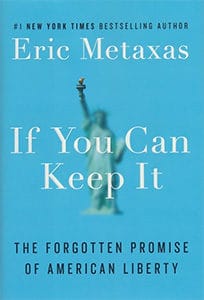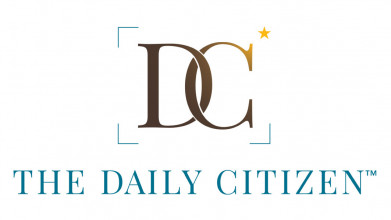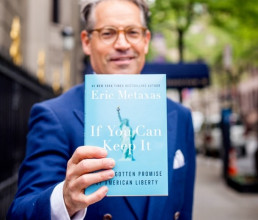John Fuller: As we celebrate Independence Day tomorrow, I have a question for you. Are you going to be celebrating for the right reasons? Here’s one perspective and I wonder if you can relate.
Excerpt:
Mr. Eric Metaxas: In our generation, since the ‘60s, we have begun to stop thinking about the greatness of America and the great heroes – Nathan Hale, Paul Revere. We – we’ve started to focus more on the anti-heroes, on the villains, on the shortcomings, on the things we’ve gotten wrong. As you just said, it is utterly important to know those things so that we don’t repeat them, to understand that we have not been perfect. We’ve done all these things wrong. But if you get to a point where you’re only focusing on that, it’s exactly the same as if you‘re saying, “I will not hear one negative thing said about my country. It’s America; love it or leave it. Get out.” Both are wrong.
End of Excerpt
John: That’s Eric Metaxas, an author, speaker, and radio host. And he truly loves this country and he also recognizes that we’ve made some mistakes in this nation over the past 240 years or so. Eric will share more insights with us on today on Focus on the Family. Your host is Focus president and author Jim Daly. And I’m John Fuller.
Jim Daly: When you think about it, John, we don’t have many heroes in our culture today. We don’t trust heroes. I think the message in the culture from the messengers are, “Don’t trust them.” And “Don’t trust our leaders.” Or whatever celebrities we may follow. We just don’t trust generally. And there’s a dangerous cynicism in this country, which is very unfortunate, especially among Christians, because despite all of the concerns and issues we see in today’s society, we know God is always at work. He’s working in people’s hearts and through institutions like the Church and even our government to fulfill His kingdom. And let me say this. We should never forget how blessed we are to live in this exceptional nation with the democratic principles of liberty and justice that we all enjoy. And, you know, I’ve traveled to about 70 countries in my work here at Focus on the Family and the differences between those nations and ours are quite obvious. And I remember the first time I returned from an international trip. I literally got down on my hands and knees and kissed that tarmac.
John: Wow.
Jim: You know, I’d see that as a boy, people returning from war, But it – it made an impression on me.
John: Hmm.
Jim: The things that we have in this country are so valuable, so special, especially when you see how it doesn’t work in other places, how people’s rights are trod upon, et cetera. And I’m telling you, the Founding Fathers, with all of their normal, human, inconsistencies and frailties, they were really wise men who set up a system that recognizes the heart of man and the motivation of reward and I hope that we can maintain this great experiment that we all refer to it as. Now, to Eric’s point, America isn’t perfect. We never were. I don’t know who claims that it’s perfect. It’s just really good. And we’ll likely make mistakes in the future. There’s no doubt about it. But we do have so much to celebrate and that’s why we want to share this great conversation today.
John: Eric Metaxas has been on this broadcast many times and he is offering some really intriguing perspectives for us to consider today. And we’ll explore a book he wrote called If You Can Keep It: The Forgotten Promise of American Liberty. We’ve got it at focusonthefamily.com/broadcast. And now, Jim, here’s how you started the conversation with Eric Mextaxas on Focus on the Family.
Jim: Eric, we’re talking about your wonderful, wonderful book, If You Can Keep It. Let’s start where that title comes from because it was a phrase that was used, a statement that was used…
Eric: Yeah.
Jim: …By one of the Framers, right?
Eric: Yeah. Benjamin Franklin, uh, he was exiting Philadelphia’s famous Independence Hall in 1787. They had just created the Constitution, which really means they had just created the United States of America. I mean, we think of 1776, but the reality is, that, uh, we won the war in 1783. We kind of bumbled around under the Articles of Confederation, trying to be a country, but we didn’t really have a federal government that was very strong. We didn’t know if it was gonna work. So, they had to go back to the drawing board and create our government. And they said, “It’s not working. Let’s go back. Let’s figure it out.” So, all the, you know, important guys get together in Independence Hall, the same place where they signed the Declaration of Independence on July 4th, 1776, and now they’re there to create the Constitution. And when it’s all over, Benjamin Franklin walks out of the building and this woman, Mrs. Powell of Philadelphia says to him, “Dr. Franklin, what have you given us, a monarchy or a republic?” Now she wasn’t joking around. So, he says, “A republic, madam, if you can keep it.” And when he said, “If you can keep it,” we kind of think of Franklin as kind of jokey, like he thought, hey, it’s a republic if you can keep it. You know, try. But he was not joking. He was serious in the sense that he and all of those in the room who had created this Constitution, who had created this new government understood that the only way it would work, the only way it would work is if the people kept the republic, if the people actually governed themselves. You cannot have self-government if the people don’t step up. That’s you and me and everybody listening. If the people don’t step up, understand what’s necessary and govern themselves. So, when Franklin said this, he was only a few years from his own death, three years. He was an older man. He had no idea if 50 years or 100 years in the future, this government would exist. So, when he said this, “If you can keep it,” it was a charge to every future American. If you don’t keep it, by definition, it goes away. It’s not that it might go away. It will go away. You have a role to play. You need to understand what it means to – uh, to govern yourself. That’s what the book is about. And what I basically say is, that in the last 40 or so years, we have forgotten what it means to live as free Americans. We have forgotten what our role is, and we have basically abdicated our role and unless we remember what this is and begin to do the work that we haven’t been doing for these 40 years, it goes away.
Jim: Eric…
Eric: And we are in a – not in a great place.
Jim: …Let me ask you this question because when you look at world history, or U.S. history – I actually love history. We read a lot of history. We’re reading Andrew Jackson’s biography right now. There’s been episodes in our history which have created fear that it’s not gonna last. It’s – it’s popping seams, our Republic.
Eric: That’s right.
Jim: So, when we look at the last 40 years, why is it different? Why should we be more concerned in these 40 years than we were the previous 160?
Eric: Well, I wouldn’t say that we should be more concerned than we were say, at the Civil War, but we should be as concerned. Why? Because anybody who thinks that our country just bumbles along and continues to exist, doesn’t have any clue of what America is. This country is fragile. Our form of government is not supposed to work. It’s supposed to fall apart unless you have a citizenry that takes a solid active role in governing themselves. Now how does that happen? First of all, you have to teach people what does it mean to govern yourself? You have to teach people what does it mean, uh, to be an American? For 200 years we were doing that. We were teaching young people and we ourselves, older people knew what does it mean to be an American? How are we different from other countries? What is wonderful about what we have and why is it worth a great effort to keep it? And by the way, we’re not keeping it just for ourselves. We’re keeping it for the whole world because we actually want the whole world to borrow these ideas, to steal these ideas, to live out the liberty that we have, to have the freedom we have – religious freedom and economic freedom and opportunity. All of this stuff was not given to us by God just for us. It was given to us to be really a shining beacon to the world. That’s where you get this image of the Statue of Liberty. We exist for others. It’s a fundamentally Christian idea, the shining city on a hill. That if we shine the light of liberty, which is very connected to Christian faith and to virtue, the whole world will say, “Hey, I want a piece of that. Can I be like that?” And so, this is something that we have basically stopped teaching in schools for 40 years. You don’t get these messages on TV, on the TV programs. You don’t get these messages in films. We have adopted, since the ‘60’s, a kind of anti-American narrative, an anti-heroic narrative. If you hear about George Washington, instead of hearing about the infinity of heroic things he did, you hear, “Oh, he was a slave owner.” We have done a profound disservice to this generation and even to our generation, us growing up in the ‘70’s or whatever, that we have not taught these things. If you have a couple of generations that doesn’t understand this stuff and that is not living it out, that is – I’m not being hyperbolic – that is the end of America and we have not been doing this and we need to get very busy.
Jim: Well, and I appreciate that. We’re celebrating Fourth of July and the creation of our country. There was a personality you really, uh, highlighted in your book and that’s Nathan Hale. Most people won’t even know who Nathan Hale is.
Eric: Yeah.
Jim: Uh, who was he and what, uh, was he doing and how did he contribute to the nation?
Eric: Well, I want to say this, that one of the reasons I wrote the book is to explain all this stuff, but also to put the stories in the book that I think are the seminal stories. Nathan Hale, Paul Revere, George Washington, why were they great? What did they do? If we don’t know these stories, we can’t really be Americans. I mean, let’s put it this way. America is an experiment in ordered liberty. America is an idea. We’re not an ethnic group. There’s no such thing as an ethnic group. We are from – my parents are from Greece and Germany and people are from Mexico and China and from all around the world and they become Americans. My parents are as American as George Washington, because they bought into an idea. To become an American is to buy into an idea. So, if people don’t know what those ideas are, we now become America in name only. We become “Americans” in quotes and the whole thing goes away. So, I said one of the most important things is to know your stories, to know the history and the heroic stories of people like Nathan Hale because these stories inspire you. Every nation and every culture has heroes and you say, you know, as Greeks celebrate every year their own independence day and they celebrate these heroes, they’re not ashamed. They don’t say, “Oh, Greece has its faults,” whatever. They say, “Of course, we have our faults, but let’s celebrate our heroes.” In America, Nathan Hale stands as one of the great heroes of the Revolution. He was first of all, a profound Christian. He went to Yale University. His dorm is still there today. You can see it. This young man decided to enroll as a Christian and as an American patriot. He wanted to fight for his country. And then George Washington needed some spies because the British – uh, their intelligence efforts, you know, were really beyond our own. We needed some Americans willing to go behind enemy lines and to do the brave work of being a spy. Nathan Hale volunteered. He was eventually caught by the British and hanged. He was 21-years-old. He was hanged about three-quarters of a mile from where we’re sitting…
Jim: Hmm.
Eric: …In an orchard on the east side of Manhattan. It was an orchard. It was a farm. He was hanged. He was 21-years-old old. The people who hanged him were moved by his character. They knew that this is an uncommon man. And when he was hanged, he said, “My only regret is that I have but one life to give for my country.” He was paraphrasing something from one of the, I think, the Romans had said, I forget who it was. But this was what he said when he was being hanged, 21-years-old. “My only regret is that I have one life to give for my country.” This man’s death was celebrated among all of the – the, uh, revolutionary soldiers. They said, “This is our hero. We’re gonna fight for him.” He was 21. He was young. He was Christian and he was a great man. And so, his name was – they wrote a couple of ballads about him and over the – the decades and the centuries, we’ve celebrated Nathan Hale.
John: So, you said he’s a great man, but he was executed at 21. So, what – there’s a contradiction there in perspective or in what he did.
Eric: Well, it’s his willingness to say, “I’m willing to die for my country.” And when he said, “My country,” he didn’t say, “Hey, my tribe, my peeps.” This was for a noble idea of liberty which he connected to his Christian faith. There was something beautiful. He was willing to die for his country and when I say he’s a great man, I mean, this was not a man who ran away from danger or who ran away from any trouble. He basically said, “What can I do for my nation?” Young people need to be inspired that to give yourself for your country is a noble thing. We’ve all – all we hear about is examples of how, oh, so and so was killed in a war that didn’t mean anything or whatever. That’s not right. It doesn’t mean we shouldn’t mention those examples, but if you only mention those examples, you do a profound disservice because thousands and even millions of people have died for noble causes. And if we don’t tell people there’s such a thing as a noble cause, that nothing matters, look out for yourself, you’re creating a generation and a whole world of selfish people who, by the way, will implode. We cannot be a great nation or a great world, we cannot have peace unless we aspire to these noble ideas. And so, one of the great stories from our own history is this young man named Nathan Hale.
John: That’s Eric Metaxas on Focus on the Family and he’s sharing inspirational stories from his book If You Can Keep It: The Forgotten Promise of American Liberty. And, of course, understanding and protecting our liberty can be challenging these days, especially when current events and trends seem to undermine the values of our faith. And that’s why we’ve created an online resource, called The Daily Citizen, which can help you navigate today’s news and issues from a Biblical perspective. We urge you to check it out at focusonthefamily.com/broadcast. And now, more from our conversation with Eric Metaxas on Focus on the Family.
Jim: Eric, you mentioned, um, the last 40 years these stories have not been shared generally. Prior to that most of us – I’m 55. In the early days of school, I – I got a lot of that history and understood who George Washington was.
Eric: Yeah.
Jim: I don’t think we caught Nathan Hale, which is what – unfortunate, but that was the beginning of that history…
Eric: Well, you and I kinda caught…
Jim: …Teaching in that.
Eric: …The tail end. We’re right on the cusp.
Jim: Yeah. So, we got some of it, but not all of it.
Eric: Well, right and some people in different parts of the country, in the South, they were much better about this, but generally speaking, the ‘60’s changed. The heroism of people, people weren’t talking about heroes. They started talking about anti-heroes. They started celebrating the dark side. They started talking about the negative narrative of what we did to the indigenous populations, uh, of the Americas. They’d talk about slavery. By the way, it’s important to talk about that stuff, but if that’s the only stuff you talk about, you do a profound disservice to history because we as a nation, abolished slavery. We repented of our sins of racism. We abolished Jim Crow laws. Most of that, by the way, came out of people of serious Christian faith, which is another very important part of the American story and a part of my book, If You Can Keep It, is that all of the Founders, every single one of them, even Benjamin Franklin, Thomas Jefferson, understood that without virtue and robust faith, America cannot exist. America cannot function. That has not been taught in schools for over 40 years. We took prayer out of the public schools. We need to understand that what we have, our form of self-government, real liberty cannot exist without a people of virtue and most of that comes out of faith. All of the Founders got that, but in our generation, we have completely forgotten this. We don’t teach it. And by the way, because it’s true, even if you don’t like it, we ought to be teaching this in the schools, public schools.
Jim: And there are some people that are, um, beginning to talk in that way, secularists even…
Eric: Oh, yeah.
Jim: …That are saying these things, that it would be very positive for us to do that. But I want to get to the divide. That was the second half of the question. We do have this great divide in the culture today…
Eric: Yeah.
Jim: …Where it is only the dark side.
Eric: Yeah.
Jim: It’s only the negative – the embarrassment of it, very little about the positive. Then you have those who are very positive, who want to sometimes negate the negative…
Eric: Yeah.
Jim: …And not address it.
Eric: Oh, you’ll always …
Jim: Past …
Eric: Right.
Jim: But the bigger question is how do we begin to pull this back together…
Eric: Well, first of all …
Jim: …So that our Republic can survive?
Eric: …I – OK. First of all, in the book I talk about how I believe we are obliged to love our country. Now as Christians, how do we define “love?” That’s the other thing. Love doesn’t mean I agree with everything. But if I have a son or a daughter who’s not behaving the way I like, what does it mean to love that child? Do I just say, “Hey, keep on doing the bad stuff?” No, but do I want to curse this kid and saying, “You’ll never amount to anything. You’re a bum. You’ve always been this way. You’re just like your mother.” Or “You’re just like your father.” That’s to curse, rather than to love. That’s to judge and through judgment to curse. And so, to love is to call someone higher. So, to love your country doesn’t mean to agree with all the bad stuff, but it means to praise if for the good stuff. When you praise a kid for what he does well or what she does well, you’re calling them higher. You’re saying that, at the bottom of everything, “I love you. I want you to be better.” We have to have a healthy view of what does it mean to love your country. And if we do not love our country, we kill our country, just like a kid. If you refuse to praise the kid, you’re so mad at that kid that you will never praise him, you will never look at him, you will never say, “You did a good thing because I – I don’t want you to ever forget all the bad stuff you did.” Ff you do that, we know that that cripples the soul of that kid.
Jim: Hmm.
Eric: I would argue that we have done that, that the larger culture has done that to this nation. That if you do not celebrate what is good and beautiful, true in America, first of all, you’re telling a lie, because those things happened, and they need to be celebrated. But secondly, you’re limiting America. You’re basically destroying America even though you claim you’re not, you’re destroying it. And I think that, that is what is happening, that the voices in the culture that want to focus on how, oh, everybody’s racist and we haven’t dealt with this and we haven’t dealt with this. We have always had problems, but I would say to our credit as a nation, we have always tried to get it right. And when you start saying, uh, “It’s not good enough. It’s not good enough,” it really is like telling a kid, “You’ll never be good enough. You’ll never be good enough.” You crush that kid and that kid eventually says, “Well, you know what? I’m not gonna even try anymore.” I really think that there’s a lot to celebrate in America and by the way, uh, if you don’t teach kids what is great about this country, they really can’t even know who we are as a people.
Jim: Sure.
Eric: We have done great things in the world and I would argue, as I said earlier, that the greatest thing about America is, that we have been a nation for others. It’s a Christian idea. Bonhoeffer said, “Jesus is the Man for others.” We want to help the whole world. We have been generous in all kinds of ways with blood and treasure. But even with trying to export our ideas of liberty, we don’t say, “This is our idea.” We love to bring economic freedom, uh – and, uh, religious freedom all around the world. But if we’re not taking care of it, keeping it, you know, here, then we don’t have any to give away…
Jim: That’s so true.
Eric: …And I really think it’s important.
Jim: You know, one of the tough questions, Eric, and I – I’ve talked with African-American leaders in this country about this. You know, when you look at the Founding Fathers, they didn’t deal with slavery at that moment. And there’s a deep wound in that community that they – they didn’t…
Eric: Yeah.
Jim: …Eradicate slavery.
Eric: And that is very real. Absolutely.
Jim: But I…
Eric: Yeah.
Jim: …Would suggest, interestingly enough and you know, somebody will jump on that say, “Well, that was culturally acceptable. It was the economic engine,” all those things…
Eric: Yeah. Yeah.
Jim: …To try to justify it. But I would also suggest that they at least created the framework that over time and that – that’s hard, but it would be remedied. Do you think they understood that the Constitution would eventually…
Eric: Some of them…
Jim: …Bring freedom?
Eric: …Did. Some of them definitely did and some of them didn’t. I mean, again, this is one of these things that it’s so complicated. You know, you can talk on one side of it or on the other side of it. I think you have to talk on both sides of it. Sin is sin. I mean, slavery is sin. But when you look at it historically, the entire world was filled with slavery until the 19th century. I mean, Wilberforce abolished in 1833 in Great Britain. It’s not like America was the only place in the world with it. This has existed all over the world and 19th century humanity finally battles for this. So, it’s very easy to say, “Oh, George Washington’s a hypocrite and Jefferson’s a hypocrite” and whatever. Oh, by the way, you’re a hypocrite and I’m a hypocrite. If you’re a Christian, you understand you are not perfect. You get stuff wrong. So, it’s easy for us to point the fingers. The fact of the matter is, that they did, as you just said, create a framework whereby we went to war and a half a million people bled to death to defeat slavery. I mean, God would prefer that we didn’t have to go that route, but we did. I mean, these are thing – sins that needed to be repented of. But if we can’t ever celebrate that, I mean, isn’t there a time when you say, “Praise Jesus; we abolished slavery.” Well, it’s not like a foreign power came in and forced us to abolish slavery. We of our own accord abolished slavery. We abolished Jim Crowe laws in America. If you can’t celebrate that, something’s wrong with you. You have to be able to celebrate the good stuff if you want the right to criticize the bad stuff.
Jim: Yeah. As a – your parents were Greek immigrants into the country, came into …
Eric: Well, my dad came from Greece and my mom came from Germany. And today they are Americans.
Jim: And in that process, uh, you were born here, raised in New York.
Eric: Yeah.
Jim: 9/11 happens. That would – had to be a profound moment for you, for…
Eric: Yeah.
Jim: …Your family. What does it mean now to be attacked in that way?
Eric: Right.
Jim: Um, what were your thoughts on that day?
Eric: I actually write about that in the book because it was as a result of 9/11 that I fell in love with my country. I realized that I didn’t really love America. Because I – listen I went to Yale and that whole world of academia. It’s kind of a liberal culture. It really teaches you that patriotism is something for, you know, hicks. It’s something for the past. We – we’re more mature and sophisticated and we don’t go, “Rah, rah! America’s great.” And I think we carried that way, way, way too far. And I remember and again, I write about this in my book, If You Can Keep It, but there was some months after the attack, it was a very weird time in New York, a very somber time. And I was on a speed ferry going to New Jersey with my wife and our 2-year-old at the time to visit our in-laws and we passed the Statue of Liberty. And it was a glorious day and I looked at the Statue of Liberty and I suddenly got choked up. And for the first time in my life, I got choked up about my country and about the liberty. And I thought to myself, “Look at that statue, facing outward, welcoming the people that spat on our face. Welcoming the whole world to come to our shores, as we can let them in, as we can afford to assimilate them. We look outward and we say, “Give me your tired, your poor.” So, when people say we’re a nation of immigrants, that’s the whole point is that we’ve always been outward focused and we have always said, “No matter what, we’re not here for ourselves.” But after this attack on 9/11, to see this statue still standing, you know, like very close to where the attack happened. Holding this – it just got to me. I just got choked up and it made me think that I have not loved my country and I have not appreciated what this country is. And I thought about my parents passing the Statue of Liberty. I write about that in the book, too, that when they were in their 20’s, my dad on a ship, my mom on another ship, they saw this statue and they didn’t go, “Oh, phew. That’s a nice idea. What a bunch of hypocrites.” No, no, no, they said, “Oh! Thank God I get to come to America. I get to have an opportunity. I get to raise my children as Americans. And to have sons and grandchildren that will be Americans and that will live the American dream. I get to do that.” I – my parents passed that on to me and I think sometimes if you live in America, you – it’s easy for us to take it for granted. But at 9/11, it just – it hit me.
Jim: Well, and that’s powerful and that’s the way I think that kind of an event, as dark and as evil as that was, that is the silver lining that comes from that…
Eric: At least it…
Jim: …To remember…
Eric: …Was for me…
Jim: …What we have.
Eric: …And for a lot of people.
Jim: Eric, it’s been great to have you with us once again. Thank you for the biographies that you have written. And the ones that you’re writing. Um, it’s just – it is a real encouragement for all of us, so thanks for the labor of love that you go through with each of those books and thank you for being with us.
Eric: Well, it is truly my privilege. Thank you.
John: This is Focus on the Family with Jim Daly. And our guest today was Eric Metaxas, talking about his book, If You Can Keep It: The Forgotten Promise of American Liberty.
Jim: John, that conversation with Eric was so inspirational and I hope our listeners were motivated and challenged by it. It’s good to be reminded about the great things we have in America today. And let me encourage you to get a copy of Eric’s book. We barely covered what’s in there. It’s filled with such rich history and fascinating stories that I know you’ll enjoy. And you may want to share some of it with your own children or maybe your grandkids If you can send a gift of any amount to Focus on the Family today, we’ll get a copy right out to you as our way of saying thank you. And let me remind you about our matching gift campaign this summer. Thanks to some generous friends, any financial gift you send will be doubled. So, $25 becomes $50 and so on. It’ll save more marriages, more parents will be equipped to lead their families, and more people hearing about the great news of Jesus Christ. So, let’s help more families by working together this summer. And let me say thank you in advance for your generosity.
John: Please make your donation online. Our staff is taking the day off to celebrate the holiday weekend. Our website is focusonthefamily.com/broadcast. Trusting you have a great, wonderful Independence Day weekend with your family and, uh, that you get to celebrate with your church family as well. And then join us on Monday when we hear a powerful reminder about praying for your children.
Teaser:
Mrs. Brooke McGlothlin: But I knew in that moment as God whispered to my heart, the same as you and I are talking right now, that God was speaking to me. And He said this to me. He said, “Brooke, don’t give up. These boys need someone to fight for them, and I have chosen that person to be you.”























